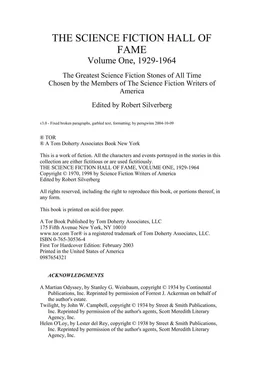And I heard him give a little sob of defeat—and the song ended. Jim tried a few notes. He hasn't a good ear for music—but that was too powerful to forget. Just a few hummed notes. Jim hasn't much imagination, I guess, or when that man of the future sang to him he would have gone mad. It shouldn't be sung to modern men; it isn't meant for them. You've heard those heart-rending cries some animals give, like human cries, almost? A loon, now—he sounds like a lunatic being murdered horribly.
That's just unpleasant. That song made you feel just exactly what the singer meant—because it didn't just sound human—it was human. It was the essence of humanity's last defeat, I guess. You always feel sorry for the chap who loses after trying hard. Well, you could feel the whole of humanity trying hard—and losing. And you knew they couldn't afford to lose, because they couldn't try again.
He said he'd been interested before. And still not wholly upset by those machines that couldn't stop. But that was too much for him.
I knew after that, he said, that these weren't men I could live among. They were dying men, and I was alive with the youth of the race. They looked at me with the same longing, hopeless wonder with which they looked at the stars and the machines.
They knew what I was, but couldn't understand.
I began to work on leaving.
It took six months. It was hard because my instruments were gone, of course, and theirs didn't read in the same units. And there were few instruments, anyway. The machines didn't read instruments; they acted on them. They were sensory organs to them.
But Reo Lantal helped where he could. And I came back.
I did just one thing before I left that may help. I may even try to get back there sometime. To see, you know.
I said they had machines that could really think? But that someone had stopped them a long time ago, and no one knew how to start them?
I found some records and deciphered them. I started one of the last and best of them and started it on a great problem. It is only fitting it should be done. The machine can work on it, not for a thousand years, but for a million, if it must.
I started five of them actually, and connected them together as the records directed.
They are trying to make a machine with something that man had lost. It sounds rather comical. But stop to think before you laugh. And remember that Earth as I saw it from the ground level of Neva City just before Reo Lantal threw the switch.
Twilight—the sun has set. The desert out beyond, in its mystic, changing colors.
The great, metal city rising straight-walled to the human city above, broken by spires and towers and great trees with scented blossoms. The silvery-rose glow in the paradise of gardens above.
And all the great city-structure throbbing and humming to the steady gentle beat of perfect, deathless machines built more than three million years before—and never touched since that time by human hands. And they go on. The dead city. The men that have lived, and hoped, and built—and died to leave behind them those little men who can only wonder and look and long for a forgotten kind of companionship. They wander through the vast cities their ancestors built, knowing less of them than the machines themselves.
And the songs. Those tell the story best, I think. Little, hopeless, wondering men amid vast unknowing, blind machines that started three million years before—and just never knew how to stop. They are dead—and can't die and be still.
So I brought another machine to life, and set it to a task which, in time to come, it will perform.
I ordered it to make a machine which would have what man had lost. A curious machine.
And then I wanted to leave quickly and go back. I had been born in the first full light of man's day. I did not belong in the lingering, dying glow of man's twilight.
So I came back. A little too far back. But it will not take me long to return—
accurately this time.
"Well, that was his story," Jim said. "He didn't tell me it was true—didn't say anything about it. And he had me thinking so hard I didn't even see him get off in Reno when we stopped for gas.
"But—he wasn't an ordinary man," repeated Jim, in a rather belligerent tone.
Jim claims he doesn't believe the yarn, you know. But he does; that's why he always acts so determined about it when he says the stranger wasn't an ordinary man.
No, he wasn't, I guess. I think he lived and died, too, probably, sometime in the thirty-first century. And I think he saw the twilight of the race, too.
HELEN O'LOY
by Lester del Rey
First published in 1938
I am an old man now, but I can still see Helen as Dave unpacked her, and still hear him gasp as he looked her over.
"Man, isn't she a beauty?"
She was beautiful, a dream in spun plastics and metals, something Keats might have seen dimly when he wrote his sonnet. If Helen of Troy had looked like that the Greeks must have been pikers when they launched only a thousand ships; at least, that's what I told Dave.
"Helen of Troy, eh?" He looked at her tag. "At least it beats this thing—K2W88.
Helen ... Mmmm ... Helen of Alloy."
"Not much swing to that, Dave. Too many unstressed syllables in the middle.
How about Helen O'Loy?"
"Helen O'Loy she is, Phil." And that's how it began—one part beauty, one part dream, one part science; add a stereo broadcast, stir mechanically, and the result is chaos.
Dave and I hadn't gone to college together, but when I came to Messina to practice medicine, I found him downstairs in a little robot repair shop. After that, we began to pal around, and when I started going with one twin, he found the other equally attractive, so we made it a foursome.
When our business grew better, we rented a house near the rocket field—noisy but cheap, and the rockets discouraged apartment building. We liked room enough to stretch ourselves. I suppose, if we hadn't quarreled with them, we'd have married the twins in time. But Dave wanted to look over the latest Venus-rocket attempt when his twin wanted to see a display stereo starring Larry Ainslee, and they were both stubborn. From then on, we forgot the girls and spent our evenings at home.
But it wasn't until "Lena" put vanilla on our steak instead of salt that we got off on the subject of emotions and robots. While Dave was dissecting Lena to find the trouble, we naturally mulled over the future of the mechs. He was sure that the robots would beat men some day, and I couldn't see it.
"Look here, Dave," I argued. "You know Lena doesn't think—not really. When those wires crossed, she could have corrected herself. But she didn't bother; she followed the mechanical impulse. A man might have reached for the vanilla, but when he saw it in his hand, he'd have stopped. Lena has sense enough, but she has no emotions, no consciousness of self."
"All right, that's the big trouble with the mechs now. But we'll get around it, put in some mechanical emotions, or something." He screwed Lena's head back on, turned on her juice. "Go back to work, Lena, it's nineteen o'clock."
Now I specialized in endocrinology and related subjects. I wasn't exactly a psychologist, but I did understand the glands, secretions, hormones, and miscellanies that are the physical causes of emotions. It took medical science three hundred years to find out how and why they worked, and I couldn't see men duplicating them mechanically in much less time.
I brought home books and papers to prove it, and Dave quoted the invention of memory coils and veritoid eyes. During that year we swapped knowledge until Dave knew the whole theory of endocrinology, and I could have made Lena from memory.
Читать дальше












